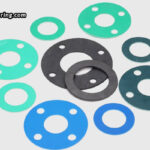In high-integrity piping systems – whether upstream, midstream, or downstream – gasket failure is not an option. For critical sealing under elevated pressure and temperature, Ring Type Joint (RTJ) gaskets remain the industry benchmark. This blog delves into their function, variants, materials, and their role in extreme operating environments, emphasizing performance reliability and adherence to specifications.
The role of Ring Type Joint Gaskets
Ring Type Joint Gaskets are meticulously engineered metallic rings designed to fit the ring grooves of RTJ flanges. They establish a metal-to-metal seal by plastically deforming under compressive load, ensuring a reliable barrier against media leakage in high-stress conditions. The key attributes include –
- Operating pressure: up to 20,000 psi
- Temperature resistance: up to 1,000°F and beyond
- Typical use: API 6A, ASME B16.5, and B16.47 flange assemblies
Ring Type Joint Gaskets provide reliable, leak-proof sealing in demanding applications. With high pressure and temperature resistance and compliance with global standards, they remain essential for critical oil, gas, and power operations.
Ring Joint Gasket Profiles: R, RX, and BX
RTJ gaskets are classified based on their geometry and pressure-handling capacity, and selecting the appropriate type is essential for optimal sealing performance.
- Type R gaskets, available in oval or octagonal profiles, are suitable for pressures up to 5,000 psi, and are commonly used in standard piping and valve systems.
- Type RX gaskets feature a pressure-energized design, enabling them to handle pressures up to 10,000 psi, making them ideal for applications involving dynamic loads and thermal cycling.
- Type BX gaskets are used for even more demanding conditions like subsea operations and high-pressure wellhead or manifold systems, as they incorporate a self-sealing design that can withstand pressures up to 20,000 psi.
It’s important to note that RX and BX gaskets are not interchangeable with standard R-type grooves, as their designs and sealing mechanisms are fundamentally different.
Material selection – Based on service environment
Material selection plays a crucial role in determining sealing durability, resistance to corrosion, and performance during thermal cycling. The materials commonly utilized include –
- Soft iron/low carbon steel – Economical choice for non-corrosive substances
- 304/316 stainless steel – Outstanding general-purpose corrosion resistance
- Inconel/Monel/Hastelloy – Suitable for sour service, aggressive chemicals, or resistance to high-temperature oxidation
- Duplex/super duplex – High-strength alloys designed for offshore or chloride-rich environments
The hardness of the material must be less than that of the mating flange face to ensure controlled deformation and maintain flange integrity.
Performance in extreme operating conditions
RTJs are designed to exceed the capabilities of traditional gaskets in environments where mechanical, thermal, and chemical stresses are present.
- High-pressure systems: Applications like wellheads, choke manifolds, blowout preventers, and subsea connectors necessitate the use of BX-type gaskets. These systems function at pressures exceeding 15,000 psi and require strong sealing to handle hydrostatic pressure and dynamic load variations.
- High-temperature service: RTJs utilized in refineries, power generation facilities, and steam turbines must endure extended exposure to superheated steam or thermal oil. The choice of alloys (such as Inconel 625 or 800HT) guarantees resistance to creep, oxidation, and thermal fatigue.
- Pressure pulsations and vibration: Processes that involve pumps, compressors, and pressure cycles gain advantages from RX gaskets. Their self-energizing design preserves sealing integrity even in the face of pressure variations or thermal expansion.
Ring Type Joint Gaskets ensure reliable performance in extreme conditions, handling high pressure, temperature, and vibration with ease. Their specialized designs and alloy options make them indispensable for critical oil, gas, and power industry applications.
Installation and handling guidelines
Improper installation or handling often leads to early gasket failure. Adhere to these recommended practices –
- Avoid reusing RTJ gaskets; deformation from initial use changes their sealing properties.
- Maintain groove cleanliness; any debris or corrosion in the flange groove can undermine seal integrity.
- Utilize calibrated torque tools; even distribution of bolt load is essential for preserving flange parallelism.
- Inspect for flange face damage; scoring or pitting may create localized leakage paths.
Following proper installation and handling practices, as those mentioned above, ensures that Ring Type Joint Gaskets perform consistently with reliable sealing and enhanced operational safety.
Avoiding common pitfalls in RTJ gasket selection and installation
Even the most precisely manufactured ring joint gasket can fail if misapplied. Avoiding these common issues is critical to maintaining seal integrity in high-pressure environments.
- Incorrect gasket type: Using a gasket that doesn’t match the flange groove can lead to leakage or even catastrophic blowout.
- Improper material selection: Choosing a material incompatible with the process media can result in rapid corrosion, degradation, and early failure.
- Improper torquing: Both over-torquing and under-torquing, often due to uncalibrated tools, can cause gasket extrusion, flange damage, or incomplete sealing.
- Reusing gaskets: Attempting to reuse a deformed gasket may seem cost-effective but can severely compromise sealing performance and operational safety.
When systems function at the limits of engineering tolerances, Ring Joint Gaskets provide the necessary precision and performance. From deepwater drilling platforms to thermal power boilers, RTJs act as an essential barrier against leakage and failure. Whether you are developing a new system or overseeing a maintenance turnaround, selecting the appropriate RTJ type, material, and manufacturer guarantees that your high-pressure sealing applications stay safe, efficient, and compliant.
Vrushabh Engineering, one of the leading ring joint gaskets manufacturers in India, delivers precision-engineered solutions for high-pressure and high-temperature applications. With strict adherence to international standards, advanced machining capabilities, and reliable quality assurance, the company ensures leak-proof performance for oil & gas, petrochemical, and power generation industries.





